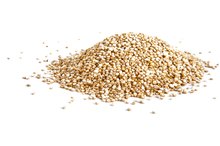The Link Between White Blood Cells & Protein
You may have heard that you need protein for a variety of reasons, including to help boost immunity. This is partially true; your immune system, which relies extensively on white blood cells, can't function without adequate dietary protein. However, you can't "supercharge" your white blood cells by eating extra protein.
White Blood Cells
White blood cells are one of the types of cells in your bloodstream. Unlike red blood cells, which carry oxygen from your lungs to your tissues, white blood cells have immune function. Perhaps the best known of the white blood cells to the layperson is the B-lymphocyte, which produces antibodies. Other white blood cells include T-lymphocytes, which include killer cells, and macrophages, which are large cells that consume parts of viruses and bacteria.
- White blood cells are one of the types of cells in your bloodstream.
- Other white blood cells include T-lymphocytes, which include killer cells, and macrophages, which are large cells that consume parts of viruses and bacteria.
Protein
ATP & Protein
Learn More
Protein is one of the macronutrient molecules that you need to eat in order to sustain health. Macronutrients are chemicals that you need in large quantities each day; the other macronutrients are carbohydrates and fats 1. You can break down proteins and the other macronutrients to provide you with energy as well as with cellular building blocks. Specifically, you break proteins into building blocks called amino acids.
- Protein is one of the macronutrient molecules that you need to eat in order to sustain health.
- You can break down proteins and the other macronutrients to provide you with energy as well as with cellular building blocks.
White Blood Cells And Protein
All white blood cells require amino acids in order to sustain normal function. Some of the uses of amino acids by white blood cells are very apparent in immune function. For instance, antibodies are proteins, and are therefore made up of amino acids. You have to eat proteins to get the amino acids that your B-lymphocytes use to make antibodies. Even white blood cells that don't make antibodies, however, need protein; all cells require protein for energy and to make major structural and functional molecules that operate within the cells.
- All white blood cells require amino acids in order to sustain normal function.
- Even white blood cells that don't make antibodies, however, need protein; all cells require protein for energy and to make major structural and functional molecules that operate within the cells.
Considerations
Hemp Protein and Pregnancy
Learn More
While you need to eat protein as part of a balanced diet in order to maintain white blood cell function, there's no scientific research to suggest that eating extra protein -- or eating specific amino acids -- will help enhance white blood cell function. Instead, you should aim to consume an appropriate amount of protein each day. The Harvard School of Public Health recommends getting 20 to 25 percent of your daily calories from protein, where each gram of protein is about 4 calories of energy.
Related Articles
References
- “Biochemistry”; Reginald Garrett, Ph.D. and Charles Grisham, Ph.D.; 2007
- Mayadas TN, Cullere X, Lowell CA. The multifaceted functions of neutrophils. Annu Rev Pathol. 2014;9:181-218. doi:10.1146/annurev-pathol-020712-164023
- Mcbrien CN, Menzies-gow A. The Biology of Eosinophils and Their Role in Asthma. Front Med (Lausanne). 2017;4:93. doi:10.3389/fmed.2017.00093
- Cromheecke JL, Nguyen KT, Huston DP. Emerging role of human basophil biology in health and disease. Curr Allergy Asthma Rep. 2014;14(1):408. doi:10.1007/s11882-013-0408-2
- Hoffman W, Lakkis FG, Chalasani G. B Cells, Antibodies, and More. Clin J Am Soc Nephrol. 2016;11(1):137-54. doi:10.2215/CJN.09430915
- Karlmark KR, Tacke F, Dunay IR. Monocytes in health and disease - Minireview. Eur J Microbiol Immunol (Bp). 2012;2(2):97-102. doi:10.1556/EuJMI.2.2012.2.1
- Görgens A, Radtke S, Horn PA, Giebel B. New relationships of human hematopoietic lineages facilitate detection of multipotent hematopoietic stem and progenitor cells. Cell Cycle. 2013;12(22):3478-82. doi:10.4161/cc.26900
- Hong JW, Noh JH, Kim DJ. Association between White Blood Cell Counts within Normal Range and Hemoglobin A1c in a Korean Population. Endocrinol Metab (Seoul). 2018;33(1):79-87. doi:10.3803/EnM.2018.33.1.79
- Riley LK, Rupert J. Evaluation of Patients with Leukocytosis. Am Fam Physician. 2015;92(11):1004-11.
- Flores-mireles AL, Walker JN, Caparon M, Hultgren SJ. Urinary tract infections: epidemiology, mechanisms of infection and treatment options. Nat Rev Microbiol. 2015;13(5):269-84. doi:10.1038/nrmicro3432
- Kasi PM, Grothey A. Chemotherapy-Induced Neutropenia as a Prognostic and Predictive Marker of Outcomes in Solid-Tumor Patients. Drugs. 2018;78(7):737-745. doi:10.1007/s40265-018-0909-3
- U.S. Library of Medicine. MedlinePlus. White Blood Cell Count. https://medlineplus.gov/ency/article/003643.htm
Writer Bio
Kirstin Hendrickson is a writer, teacher, coach, athlete and author of the textbook "Chemistry In The World." She's been teaching and writing about health, wellness and nutrition for more than 10 years. She has a Bachelor of Science in zoology, a Bachelor of Science in psychology, a Master of Science in chemistry and a doctoral degree in bioorganic chemistry.







